Many guitarists have multiple guitars, and sometimes they change them between songs, whether they are on a stage during a live performance or practicing at home.
But, Why do guitarists change guitars between songs? Guitarists change guitars to either get a different sound, change to a different tuning, or compensate for technical issues.
There are some benefits when it comes to changing guitars between songs. The sure thing is, this will help you play a song in its actual shine.
Why Do Guitarists Have Multiple Guitars?
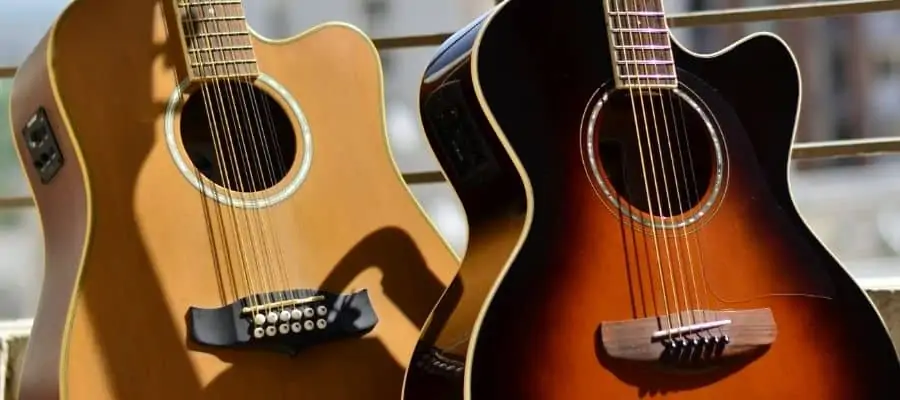
An average guitar player owns between seven and eight guitars. Guitarists have multiple guitars for many reasons.
A Quick Tuning Change
Some people say changing tunings is pretty time-consuming if you use a tuner every time. Also, they wouldn’t like to see a guitarist change tunings on the stage and upset the whole show.
But, even if you change tuning with a tuner, you may sound out of tune soon. It’s because different tunings mean different string tension.
You will need to adjust the spring tension of the bridge if you change the tuning on a tremolo or Floyd Rose bridge. You can’t do it during the live performance. Fixed bridges are simpler and you will be able to play a different tuning right away. But, it is recommended to adjust the truss rod as well.
Any increase in string gauge size requires a new guitar setup that includes relief, action, and intonation, and it takes time, mainly if your guitar stays at the luthier’s workshop because it needs nut re-slotting or truss rod adjustments.
Collecting As A Hobby
Plenty of guitars together in a room corner is someone’s passion and desire. Many people find collecting guitars their main hobby, and taking care of them makes their day.
Perry Margouleff, a well-known guitarist, producer, and guitar collector, has a collection that includes approximately 300 guitars made in America in the 20th century, and he says he is acting to those guitars like they are humans.
Better Safe Than Sorry
It’s good to have a spare guitar, especially if you are at a concert and don’t want people to wait for you until you get a new string on the guitar. I bet you don’t want to ruin the whole flow.
Also, if your guitar is ready to visit a luthier, be sure you will not have an instrument to play with for a while, especially if it needs some serious adjustments.
Traveling with a guitar can have a not-so-good end if someone steals it from your car or if it damages because of the humidity and constant temperature fluctuation. So, having a spare travel guitar is a safe and practical option.
Guitar Acquisition Syndrome
Guitar collectors collect guitars and love them for life, just like they are part of them. On the other side, some people also collect guitars and accessories, like them for a while, and then feel dissatisfied and ready for a better substitution. It’s called Guitar Acquisition Syndrome or GAS in short. Therefore, a person’s life aspects can be affected by owning multiple guitars and other gear. That includes relationships, finances, a job, and so on.
Multiple Experiences
Multiple guitars mean multiple experiences. Some guitarists love to experiment, and that’s why they have various guitars, or they need a tonal variety to express their creativity.
Do You Need Different Guitars For Different Songs?
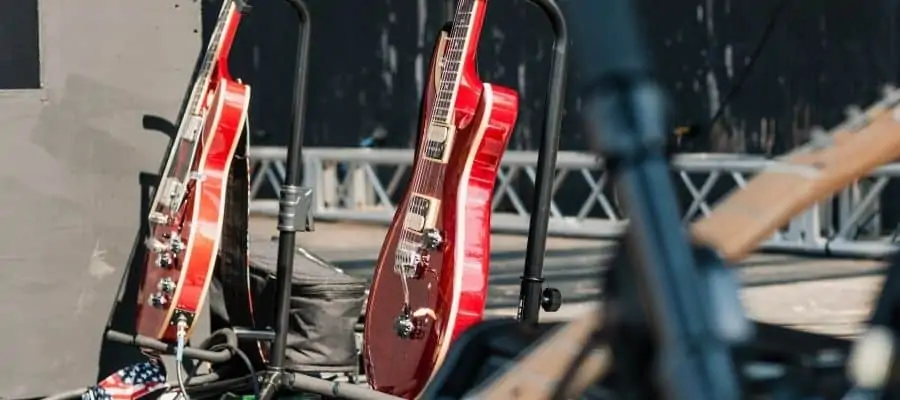
You can play any song on any guitar type. But, each song sounds in its actual shine on a specific type of guitar, and you’ll see that one song sounds way better on a Les Paul than on a classical guitar.
All guitars have unique personalities, and different songs will not sound the same on different guitar types. For example, you can play a jazz song on every guitar type, but one of the jazz guitar prototypes is the archtop guitar, such as Gibson ES-175 and Gibson L-5, and you will jazz up the song for sure!
Do You Need Multiple Guitars for Different Tunings?
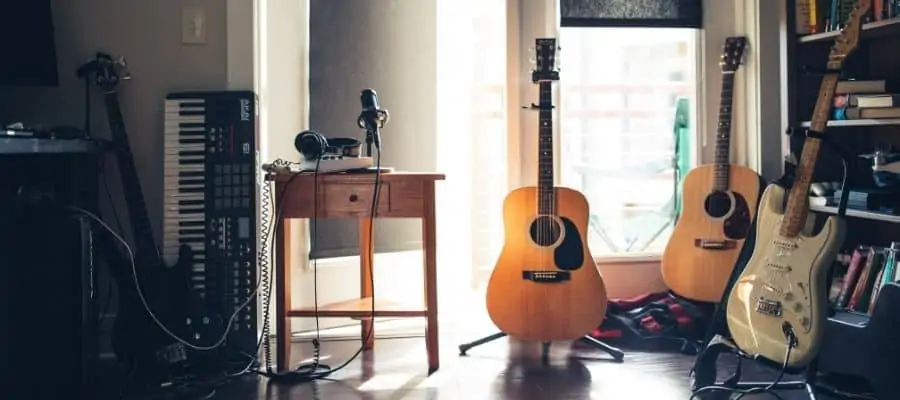
As I said, you can change tuning on the guitar using a tuner, but it is a pretty time-consuming thing, especially if you’re new to them or if you change them often (daily, for example), and changing tunings can also have some negative effects on your guitar.
Changing tunings can have some negative effects. Guitar strings can be destroyed if you change tunings frequently because it means you’re changing the string tension, which can increase the possibility that guitar string metal gets weakened. It’s one of the reasons why guitarists have specific guitars for specific tunings, together with saving time.
Open E tuning puts more tension on the guitar neck because the third string is tuned up a half step, fourth and fifth guitar strings are tuned up a whole step. That can damage the guitar neck. But, dedicating one guitar is the best possible solution. Of course, you may need a proper setup.
When it comes to tuning down the guitar, that indicates less tension, so the guitar goes out of tune rapidly. It’s because the string pulls back into the original guitar string tension. Stretching out strings as a preventive method is effective for the guitar to be in tune for a longer time, but you may need to do that between every song. If you dedicate one guitar to this alternate tuning, strings will settle over time.
Can You Use Any Guitar For Any Genre?
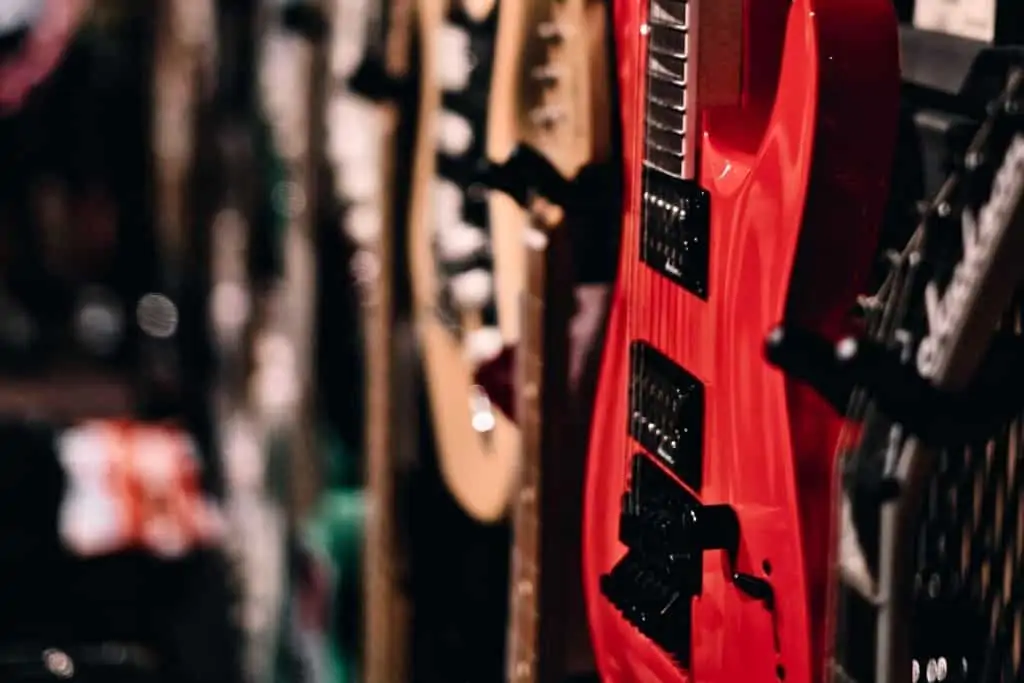
The guitar is a proper instrument in many genres, such as blues, pop, rock, jazz, folk, and metal. Every genre has its specificity, and therefore, some things need to be adapted-strumming patterns, specific chords, and progressions.
Each guitar you play has a variation in its sound compared to other guitars. No two guitars sound exactly the same. The more often you play the guitar, the easier it is to recognize tonal differences.
Classical guitars produce a mellow and soft sound that is a good option for folk, jazz, pop, and Flamenco, while acoustic guitars have a brighter tone adequate for blues, country, pop, and rock. Electric guitars are the best option in countless styles, such as punk, rock, metal, and more.
You can play any genre on any guitar, but the sound is not going to conjure up the genre’s specificities. So, it’s important to find the perfect match for a preferred music genre. The right guitar for you is one that gives the best when it comes to the type of music you play. You definitely will not choose a classical guitar if you want to play some heavy riffs and have distortion.
For example, rock playing requires guitars that have a good response to overdrive and distortion. For an adequate rock song performing, you should play on a Les Paul or Fender Stratocaster. Guitar, such as Gibson ES-335, which produces a cleaner and less distorted sound than rock playing with more focus on rhythm, is ideal for the blues genre.
Do All Guitars Have A Different Sound?
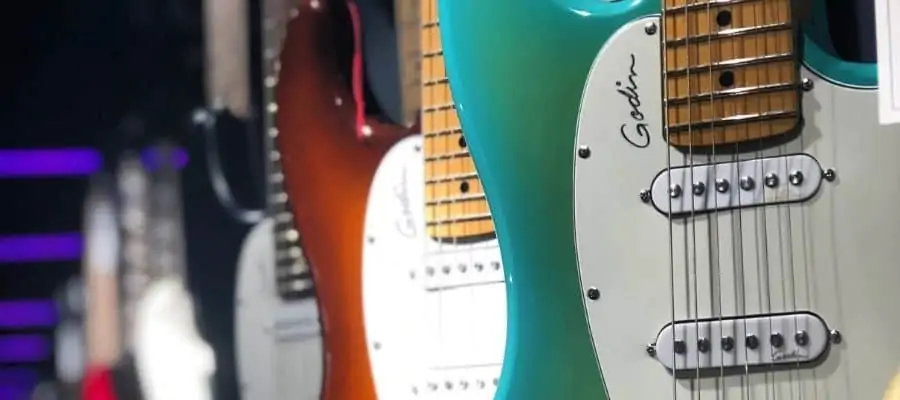
Different guitars have different sounds, and as I said, no two guitars sound the same. There are so many factors that determine these differences. For example, if you want to play Flamenco, it will not have the same sound on every classical guitar.
Pickups
Pickups are magnets that pick up the guitar strings’ vibrations and send the signal to the amp. They make a huge difference in the sound, but that does not mean that putting the same as Les Paul’s pickup on Epiphone will convert Epiphone to Les Paul.
There are single-coil pickups that are pretty noisy. They have a clearance in the sound, for example, on Fender. But Gibson’s single-coil pickups have a bit darker sound. Humbuckers got their name because they minimize the humming sound. They also have a more booming and thicker sound.
Besides pickups variations, one more thing that can affect the sound is pickup placement. A bridge pickup sounds different than the neck pickup, even if it is about the same pickup. Neck pickups sound warm and mellow, and they are good for clean tones and rhythm guitar. On the other side, bridge pickups sound bright and sharp, and they are good for high gain and lead guitar playing.
Guitar Construction
Some of the things that contribute to the way your guitar is going to sound are tonal woods, neck size and body size, neck joint, and guitar body type.
Different tonal woods make a difference when it comes to sound. They allow the guitar to balance tone and resonate. Some frequently used tonal woods are mahogany, rosewood, cherry, spruce, and much more.
There is also one classification of tonal woods – softwoods and hardwoods. Softwoods, such as cedar and mahogany, are known for warm tones and the ability to respond to dynamic playing. Hardwoods are woods that give a brighter sound.
A neck joint determines how much sustain the guitar will have and how each note will resonate. Sustain can also be affected by a guitar body. The guitar can be hollow or solid, with a flat or arched top.
Strings
Different guitar types have different strings. Guitar strings are different in core materials, winding material, and string gauge size. All of that can affect the sound.
For example, there are nickel-free electric guitar strings with a very bright tone, while pure-nickel guitar strings will give you a mellow sound. Medium string gauge size is excellent for blues and rock, while heavy-gauge guitar strings are popular in jazz music.
Strings are an easy-to-change thing, so if you want your electric guitar to sound brighter, use nickel-plated steel strings, not pure-nickel ones. But even if you change it, your guitar may not sound as bright as another one. So, strings are just one part of the variety-sound puzzle.
How Many Guitars Should A Guitarist Have?
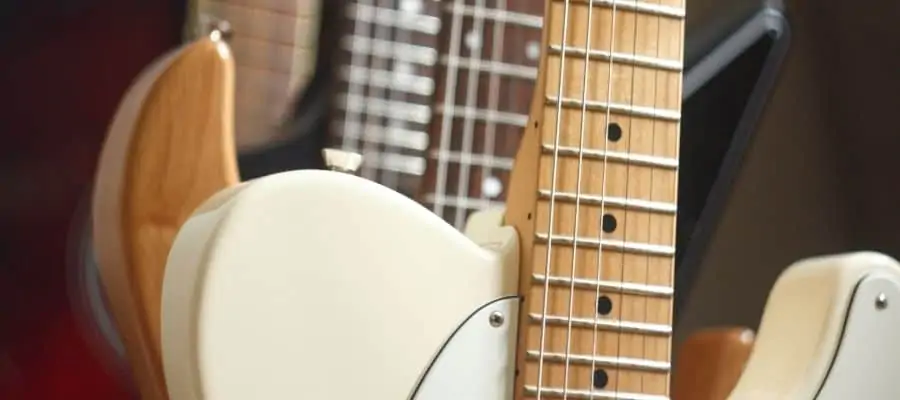
How many guitars a guitarist should have, depends on the guitarist’s skills and needs.
For beginners, it’s enough to have one guitar, and even it’s not recommended for them to switch guitars in this stage of playing because they have to focus on one instrument and get to know it very well.
Intermediate players have already found their playing genre, so their choice is based on that. It’s recommended to have one classical, one small, and one large-body acoustic guitar, one guitar with the single-coil pickup, and one with humbuckers. It is also good to have one guitar as a travel guitar.
Professionals need more guitars than the two previous-mentioned groups of guitarists. They experiment, and they use alternate tunings more. They also need more tone variety and spare guitars to be safe during concerts.
How Many Different Guitars Do You Need?
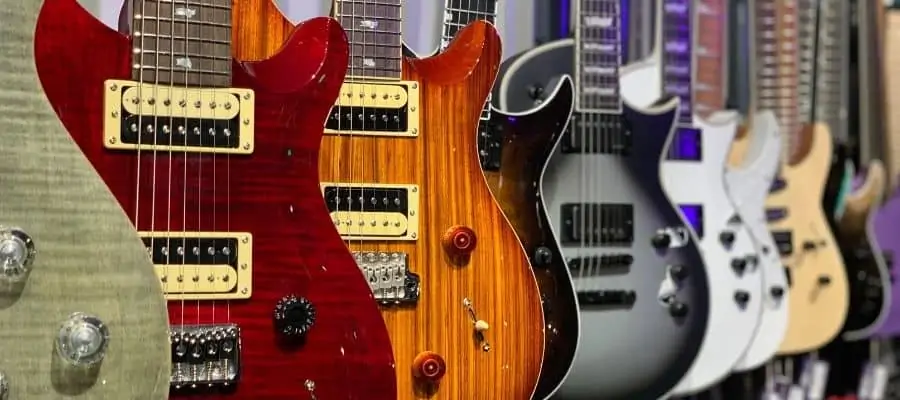
Only you can answer this question. It depends on what level you are, as I said in the previous text. But, every guitar collection needs to have a border – if you see you don’t have enough time to care about more of them or if you don’t have time to play any more of them or don’t have the room to store any more of them safely, you have just enough.
Do Different Guitars Feel Different?

Different guitars do feel different because every guitar has its personality. Some reasons why different guitars feel different are neck width/girth, neck radius, neck material, and finish, fretboard material and finish, string gauge and action, and string spacing. Also, the guitar may feel different from another one due to different scale length, guitar body type, body weight, neck/body balance, saddle style, bridge style, and much more.
But, the word ‘feel’ is a personal thing – for some guitarists, the string spacing is a huge deal, while others don’t see the difference. Some people hate neck finish, while others don’t.
So, you have to hold many guitars to see what suits you the best. Often you can see a guitarist on a stage changing guitar between songs because he finds a particular guitar more suitable for him to give the best possible song performance.
Unless you want a thicker tone, changing a Strat with a Les Paul will not sound that different, but if your playing for a particular song is better on a Les Paul, then go for it. It’s all about personal preference.
Does Changing Guitars Save Time?
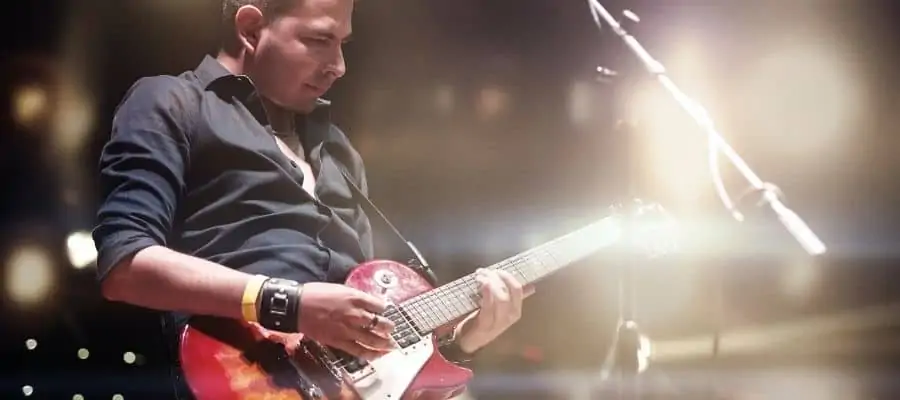
Changing guitars does save your time. If you often change tunings, it is a perfect solution for you. On the contrary, you have to tune your guitar with a tuner and re-tune it often because changing one tuning into another will pull back strings into an original position so you will sound out of tune. Better to have another guitar for a particular tuning to let the guitar strings settle in.
If you feel your guitar is out of tune, then having a spare guitar is an excellent solution not to bother yourself with a tuner.
If string breaks in the middle of practicing or playing, you will save time if you have a spare guitar near you, and you won’t destroy the show flow. On the contrary, you’ll need to re-tune it frequently.
Conclusion
Different guitars have different DNAs. No guitar is the same as another one, and each of them is for a particular purpose, like a specific tool. That’s why guitarists have multiple guitars. They want to give the actual shine to every song. Some of them love experimenting with tone variety, and it’s their way of expressing creativity.
But, having multiple guitars makes some things much easier. For example, guitarists tend to change tunings often because different songs require different tunings. Tuning guitar between songs is pretty time-consuming, and guitar strings tend to go into the original position, so your instrument may be out-of-tune very often. Having a guitar for a specific tuning is a good solution because strings will settle over time, and you will save time.
Sounds are different on different guitars. To perform a song in the best way, you should choose a guitar that fits the genre you play. If you want to add a Spanish dash to a song, then choose a classical guitar. If you want the sound to be overdriven and distorted, an electric guitar is the best possible solution. Every genre has its specificity, and therefore you should adjust some things, such as strumming patterns, specific chords, and progressions.
But, if you see a guitarist change guitar between songs, alternate tunings or a tone variety may not be the reason – maybe there are some technical issues, such as spring break, electronic issues, and much more.
Guitarists make a special connection with instruments, and they play some songs better on one guitar than on another, so they change guitars between songs just because of their preferences, or maybe to match a guitar color with the outfit.
If you found this article useful you may want to save this pin below to your Guitar board

Recent Posts
When learning new songs have you noticed that some of the chord sequences sound really good? But when you tried to come up with your own chord sequence, or as we call it chord progression, you found...
Some guitarists insist on buying an expensive amplifier with their electric guitar. They assume that this is a must for every type of guitarist out there. However, in some situations, this isn’t...

